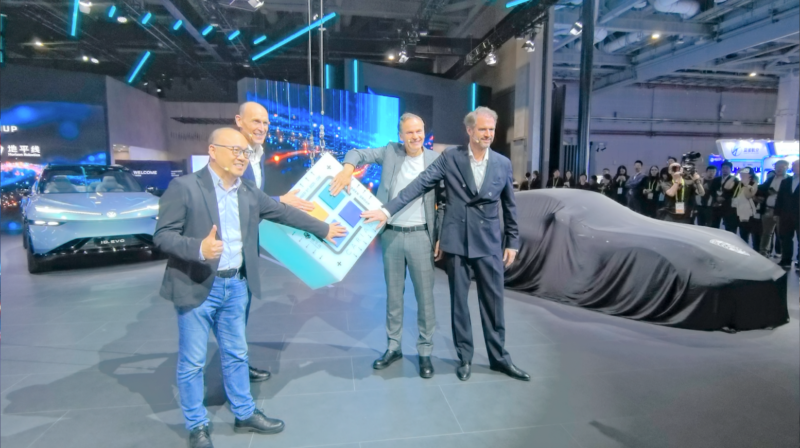Volkswagen invests 200 million USD in China for in-house System-on-Chip development
Volkswagen China announced a strategic investment of over 200 million USD to independently design and develop System-on-Chip (SoC) technology in China. This move, unveiled at the 8th China International Import Expo, marks a pivotal step in the automaker’s “In China, For China” strategy.
The in-house chip development will be spearheaded by Carizon, a joint venture between Cariad, Volkswagen’s software company, and Chinese intelligent driving technology firm Horizon Robotics. According to Han Sanchu, CEO of Cariad China, this strategic investment underscores Volkswagen’s commitment to building its own vertically integrated software and hardware system, from intelligent driving algorithms and electronic and electrical architectures to SoC.
The first SoC is projected to achieve mass production and delivery within the next three to five years, boasting a computing power of 500 to 700 TOPS per chip. This chip is expected to enhance the real-time decision-making, safety redundancy, and stable operation of intelligent driving systems, particularly during high-frequency usage.
Carizon’s initial advanced driver-assistance system solution is slated for mass production in 2025, concluding the first phase of Volkswagen Group’s independent intelligent driving R&D in China. The launch of the self-developed SoC officially ushers in “Phase Two,” where Volkswagen will further strengthen its full-stack local intelligent driving R&D capabilities, accelerate scaled mass production and commercial deployment.
Initially, these chips will be integrated into Volkswagen Group’s Chinese models equipped with L3 and above autonomous driving functions. This will enable VW China to further localise core technologies and achieve vertical integration of software and hardware, from algorithms to chips.
This investment builds upon Volkswagen Group (China)’s previously announced investment plan exceeding 100 billion yuan (14 billion USD) in 2020, aimed at deeply integrating into China’s intelligent electric vehicle industry ecosystem. The Group also established the Volkswagen China Technology Company (VCTC), its largest R&D centre outside Germany, which has already shortened product launch cycles by over 30% and optimised costs by 40%.
| Date | Related Company | Amount / Investment | Business Focus |
|---|---|---|---|
| 2020.05 | Gotion High-Tech | USD 1.1 billion, equity investment | Power batteries |
| 2020.07 | JAC Group | 4.52 billion yuan (633 million USD), capital expansion | Complete vehicles |
| 2022.10 | Horizon Robotics | 2.4 billion EUR, joint venture | Autonomous driving |
| 2023.04 | ThunderSoft | Not disclosed | Connected car & infotainment systems |
| 2023.04 | 100%TechCo | 1 billion EUR | Brand-new R&D center |
| 2023.05 | Volkswagen Anhui new production & R&D base | 23.1 billion yuan (3.23 billion USD) | Manufacturing & R&D |
| 2023.07 | XPeng Motors | 700 million USD | Equity investment |
| 2023.09 | Shanghai Muchuan Industrial Design | Not disclosed, acquisition | User experience & interface design |
| 2024.04 | Volkswagen Anhui new production & R&D base | 2.5 billion EUR | Capacity expansion |
In mid-October, it was reported by Chinese media outlet iYiou that Cariad China is on track to complete the mass production and delivery of the new CEA electronic and electrical architecture, the “brain and central nervous system” for Volkswagen’s next-generation vehicles in China, by 2025. Starting in 2026, the first models equipped with the CEA architecture and Carizon-developed advanced driver-assistance functions will be delivered to Chinese customers. By 2027, the Group plans to launch over 20 electrified models, and by 2030, approximately 30 pure electric models, accelerating its transition into the intelligent connected vehicle era.



